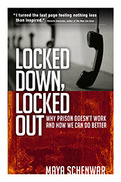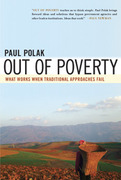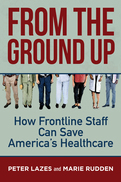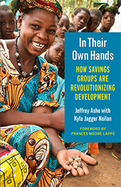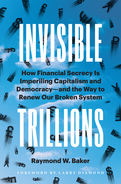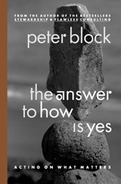Search Results: "how wealth rules"
Results 37-42 of 968
Through the stories of prisoners and their families, including her own family's experiences, Maya Schenwar shows how the institution that locks up 2.3 million Americans and decimates poor communities of color is shredding the ties that, if nurtured, could foster real collective safety. As she vividly depicts here, incarceration takes away the very things that might enable people to build better lives. But looking toward a future beyond imprisonment, Schenwar profiles community-based initiatives that successfully deal with problems—both individual harm and larger social wrongs—through connection rather than isolation, moving toward a safer, freer future for all of us.
Out of Poverty
2009
Based on his 25 years of experience, Polak explodes what he calls the "Three Great Poverty Eradication Myths": that we can donate people out of poverty, that national economic growth will end poverty, and that Big Business, operating as it does now, will end poverty. Polak shows that programs based on these ideas have utterly failed--in fact, in sub-Saharan Africa poverty rates have actually gone up. These failed top-down efforts contrast sharply with the grassroots approach Polak and IDE have championed: helping the dollar-a-day poor earn more money through their own efforts. Amazingly enough, unexploited market opportunities do exist for the desperately poor. Polak describes how he and others have identified these opportunities and have developed innovative, low-cost tools that have helped in lifting 17 million people out of poverty.
OUT OF POVERTY: What Works When Traditional Approaches Fail
- Offers a new, innovative and proven-in-the-field approach to alleviating world poverty
- Exposes the flaws in traditional approaches
- Includes moving personal stories of the people Paul Polak and his organization IDE have helped
From the Ground Up
2020
“Everyone in a hospital leadership role should read this book as it offers a wealth of practical advice for organizations intent on improving their clinical care delivery.”
—Amy C. Edmondson, professor, Harvard Business School, and author of The Fearless Organization
All Americans deserve and should have access to high quality, affordable healthcare services delivered by professionals who have sufficient time and resources to care for them. This book offers proven and practical approaches for redesigning healthcare organizations to be less fragmented—and more patient-centered—by tapping into the experiences of staff on the front lines of patient care.
Peter Lazes and Marie Rudden show how collaboration and active communication among administrators, medical staff, and patients are a core element of a successful organizational change effort. Through case studies and the direct voices and experiences of frontline workers, they explore exactly what it takes to effectively engage staff and providers in improving the patient care shortcomings within their institutions.
This book not only is a manual detailing what can be achieved when frontline staff have a direct voice in controlling their practice environments but was written to show how to accomplish transformative changes in how our hospitals and outpatient clinics work. At a time when the massive gaps in our healthcare systems have been laid bare by the fragmented responses to the COVID-19 pandemic, this book offers hope and a plan for change.
—Amy C. Edmondson, professor, Harvard Business School, and author of The Fearless Organization
All Americans deserve and should have access to high quality, affordable healthcare services delivered by professionals who have sufficient time and resources to care for them. This book offers proven and practical approaches for redesigning healthcare organizations to be less fragmented—and more patient-centered—by tapping into the experiences of staff on the front lines of patient care.
Peter Lazes and Marie Rudden show how collaboration and active communication among administrators, medical staff, and patients are a core element of a successful organizational change effort. Through case studies and the direct voices and experiences of frontline workers, they explore exactly what it takes to effectively engage staff and providers in improving the patient care shortcomings within their institutions.
This book not only is a manual detailing what can be achieved when frontline staff have a direct voice in controlling their practice environments but was written to show how to accomplish transformative changes in how our hospitals and outpatient clinics work. At a time when the massive gaps in our healthcare systems have been laid bare by the fragmented responses to the COVID-19 pandemic, this book offers hope and a plan for change.
In Their Own Hands
2014
A better way to fight poverty: Ashe and Neilan show that savings groups are simple, extremely low cost, self-managing and spread virally "there are savings groups in 100,000 villages in 65 countries Sponsored by Oxfam America: This book was developed wit
Invisible Trillions
2022
Essential reading for anyone truly interested in saving democracy from the predations of kleptocracy and plutocracy.
-Charles Davidson, The Journal of Democracy
This book expands our understanding of the financial secrecy system dominating capitalism today and shows how we can create accountability to restore our democracy.
Over the last half century, capitalism has created the means for trillions of dollars, euros, pounds, and other stores of wealth to move invisibly-beyond the control of central bankers, law enforcement agents, and international institutions. With an entire financial secrecy system now dominating capitalist operations, riches flow inexorably upward and accelerate economic inequality. And rising inequality is directly imperiling-weakening, obstructing, and degrading-democracy.
This book is not a screed against capitalism-it is a call for capitalism to return to its roots, reenergizing its synergies with democracy. Raymond Baker writes, Democratic capitalism is, in my judgment, the best system yet devised in political economy, but dysfunctions within its capitalist component are undermining the two-part system.
Baker explains the tax havens, secrecy jurisdictions, disguised corporations, anonymous trusts, fake foundations, regulatory loopholes, money laundering techniques, and more that make up the financial secrecy system. But he goes beyond the what to the why, examining the motivations driving the system that generates and shelters trillions of dollars that could go toward spreading wealth, generating public goods, and protecting the environment.
Going deeper, Baker illustrates how these realities further corrode the commonwealth, with chapters devoted to the facilitating activities and impacts of banks, corporations, enabling lawyers and accountants, governments, and international institutions and concluding with the limiting role played in policy silos that are missing the bigger picture.
Finally, he provides specific, pragmatic measures to reset capitalism so that it once again contributes to shared prosperity and sustained democracy. This is a magisterial treatment of an issue that is at the root of so many problems that plague our nation and the world today.
-Charles Davidson, The Journal of Democracy
This book expands our understanding of the financial secrecy system dominating capitalism today and shows how we can create accountability to restore our democracy.
Over the last half century, capitalism has created the means for trillions of dollars, euros, pounds, and other stores of wealth to move invisibly-beyond the control of central bankers, law enforcement agents, and international institutions. With an entire financial secrecy system now dominating capitalist operations, riches flow inexorably upward and accelerate economic inequality. And rising inequality is directly imperiling-weakening, obstructing, and degrading-democracy.
This book is not a screed against capitalism-it is a call for capitalism to return to its roots, reenergizing its synergies with democracy. Raymond Baker writes, Democratic capitalism is, in my judgment, the best system yet devised in political economy, but dysfunctions within its capitalist component are undermining the two-part system.
Baker explains the tax havens, secrecy jurisdictions, disguised corporations, anonymous trusts, fake foundations, regulatory loopholes, money laundering techniques, and more that make up the financial secrecy system. But he goes beyond the what to the why, examining the motivations driving the system that generates and shelters trillions of dollars that could go toward spreading wealth, generating public goods, and protecting the environment.
Going deeper, Baker illustrates how these realities further corrode the commonwealth, with chapters devoted to the facilitating activities and impacts of banks, corporations, enabling lawyers and accountants, governments, and international institutions and concluding with the limiting role played in policy silos that are missing the bigger picture.
Finally, he provides specific, pragmatic measures to reset capitalism so that it once again contributes to shared prosperity and sustained democracy. This is a magisterial treatment of an issue that is at the root of so many problems that plague our nation and the world today.
Modern culture’s worship of “how-to” pragmatism has turned us into instruments of efficiency and commerce—but we’re doing more and more about things that mean less and less. We constantly ask “how? and still struggle to find purpose and act on what matters. Instead of acting on what we know to be of importance, we wait for bosses to change, we seek the latest fad, we invest in one more degree. Asking how keeps us safe—instead of being led by our hearts into uncharted territory, we keep our heads down and stick to the rules. But we are gaining the world and losing our souls.
Peter Block puts the “how-to” craze in perspective and presents a guide to the difficult and life-granting journey of bringing what we know is of personal value into an indifferent or even hostile corporate and cultural landscape. He raises our awareness of the trade-offs we’ve made in the name of practicality and expediency, and offers hope for a way of life in which we’re motivated not by what “works,” but by the things that truly matter in life—idealism, intimacy, depth and engagement.Modern culture’s worship of “how-to” pragmatism has turned us into instruments of efficiency and commerce—but we’re doing more and more about things that mean less and less. We constantly ask “how? and still struggle to find purpose and act on what matters. Instead of acting on what we know to be of importance, we wait for bosses to change, we seek the latest fad, we invest in one more degree. Asking how keeps us safe—instead of being led by our hearts into uncharted territory, we keep our heads down and stick to the rules. But we are gaining the world and losing our souls.
Peter Block puts the “how-to” craze in perspective and presents a guide to the difficult and life-granting journey of bringing what we know is of personal value into an indifferent or even hostile corporate and cultural landscape. He raises our awareness of the trade-offs we’ve made in the name of practicality and expediency, and offers hope for a way of life in which we’re motivated not by what “works,” but by the things that truly matter in life—idealism, intimacy, depth and engagement.
- Winner of the 2001 Breakthrough Business Book of the Year award from Independent Publisher
- Written by the author of the bestselling books Flawless Consulting (more than 500,000 copies sold), The Empowered Manager (more than 250,000 copies sold), and Stewardship (more than 160,000 copies sold)
- Shows how our obsession with tools and techniques actually prevents us from doing things we believe in
- Identifies what is required of us to not only know what matters but to act on that knowledge


